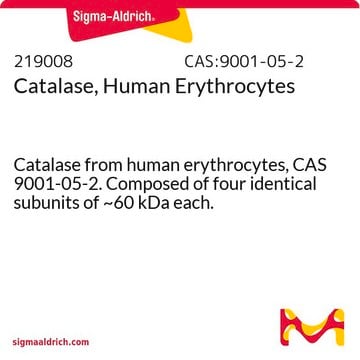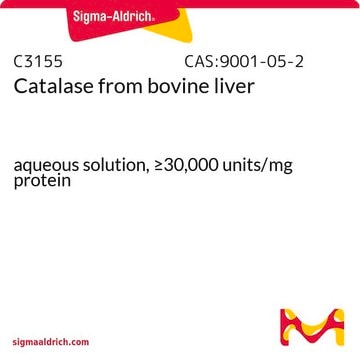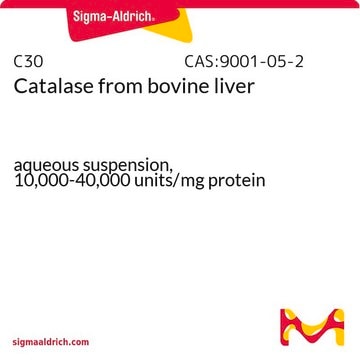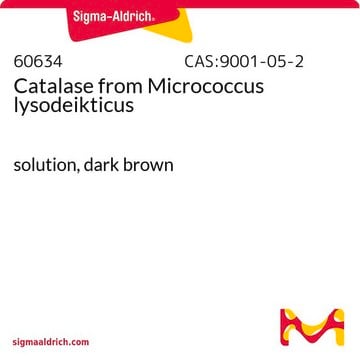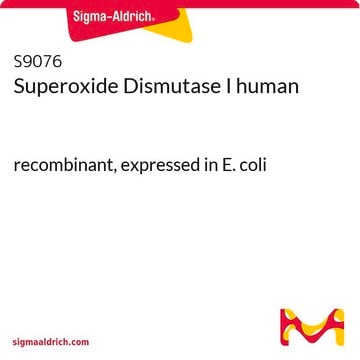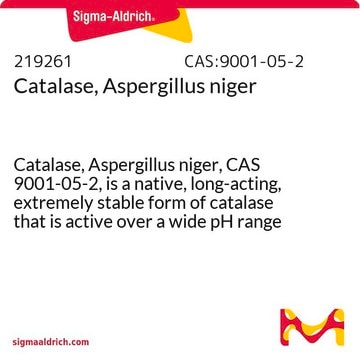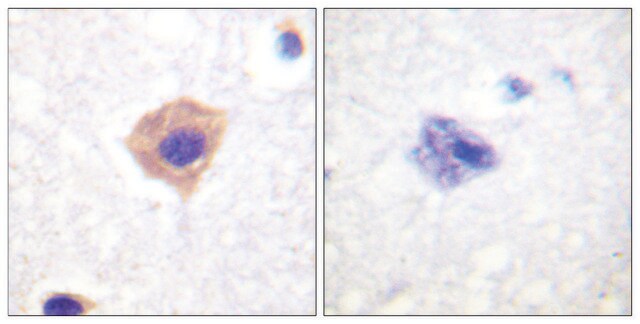C3556
Catalase from human erythrocytes
≥90% (SDS-PAGE), buffered aqueous solution, ≥30,000 units/mg protein
Synonyme(s) :
H2O2:H2O2 oxidoreductase
About This Item
Produits recommandés
Source biologique
human erythrocytes
Niveau de qualité
Pureté
≥90% (SDS-PAGE)
Forme
buffered aqueous solution
Activité spécifique
≥30,000 units/mg protein
Poids mol.
tetramer ~250 kDa
Concentration
≤10 mg/mL
Technique(s)
cell based assay: suitable
Numéro d'accès UniProt
Conditions d'expédition
wet ice
Température de stockage
−20°C
InChI
1S/C9H10O3/c1-2-12-9(11)7-3-5-8(10)6-4-7/h3-6,10H,2H2,1H3
Clé InChI
NUVBSKCKDOMJSU-UHFFFAOYSA-N
Informations sur le gène
human ... CAT(847)
Description générale
Human catalase is a member of the monofunctional heme-containing catalases. It is an intracellular enzyme located at higher concentrations in the liver, erythrocytes, and kidney. Catalase is a homo-tetrameric protein and comprises amino acid residues, one heme group that is iron III protoporphyrin IX, and a nicotinamide adenine dinucleotide phosphate (NADPH) molecule. It is a ubiquitous enzyme found in most aerobic organisms. The catalase (CAT) gene is located on the human chromosome at 11p13.
Application
- to prevent reoxidation of reduced cytochrome c by H2O2 while measuring the production of superoxide with cytochrome C.
- as a component of the imaging buffer for stochastic optical reconstruction microscopy (STORM) imaging of human skin fibroblasts
- as a component of the gloxy mix for single-molecule imaging
Actions biochimiques/physiologiques
Définition de l'unité
Forme physique
Stockage et stabilité
persons
Remarque sur l'analyse
Inhibiteur
Mention d'avertissement
Danger
Mentions de danger
Conseils de prudence
Classification des risques
Resp. Sens. 1
Code de la classe de stockage
11 - Combustible Solids
Classe de danger pour l'eau (WGK)
WGK 1
Point d'éclair (°F)
Not applicable
Point d'éclair (°C)
Not applicable
Équipement de protection individuelle
Eyeshields, Gloves, type N95 (US)
Certificats d'analyse (COA)
Recherchez un Certificats d'analyse (COA) en saisissant le numéro de lot du produit. Les numéros de lot figurent sur l'étiquette du produit après les mots "Lot" ou "Batch".
Déjà en possession de ce produit ?
Retrouvez la documentation relative aux produits que vous avez récemment achetés dans la Bibliothèque de documents.
Les clients ont également consulté
Articles
Cellular oxidative stress is countered by enzymatic scavengers and antioxidant modulators against reactive oxygen species damage.
Cellular oxidative stress is countered by enzymatic scavengers and antioxidant modulators against reactive oxygen species damage.
Cellular oxidative stress is countered by enzymatic scavengers and antioxidant modulators against reactive oxygen species damage.
Cellular oxidative stress is countered by enzymatic scavengers and antioxidant modulators against reactive oxygen species damage.
Protocoles
This procedure may be used for all Catalase products.
Notre équipe de scientifiques dispose d'une expérience dans tous les secteurs de la recherche, notamment en sciences de la vie, science des matériaux, synthèse chimique, chromatographie, analyse et dans de nombreux autres domaines..
Contacter notre Service technique
